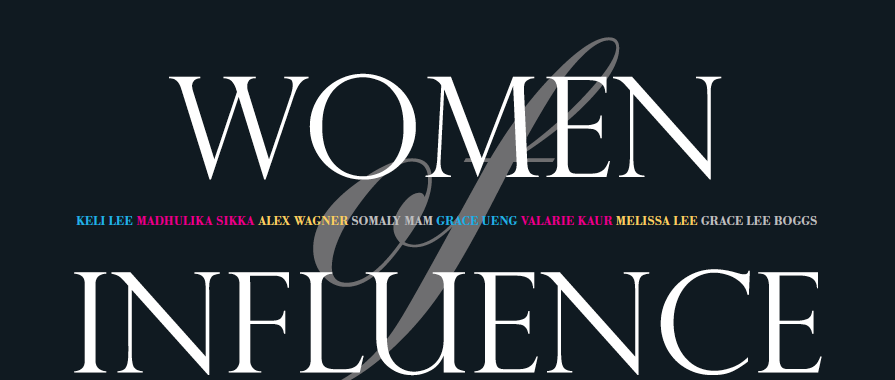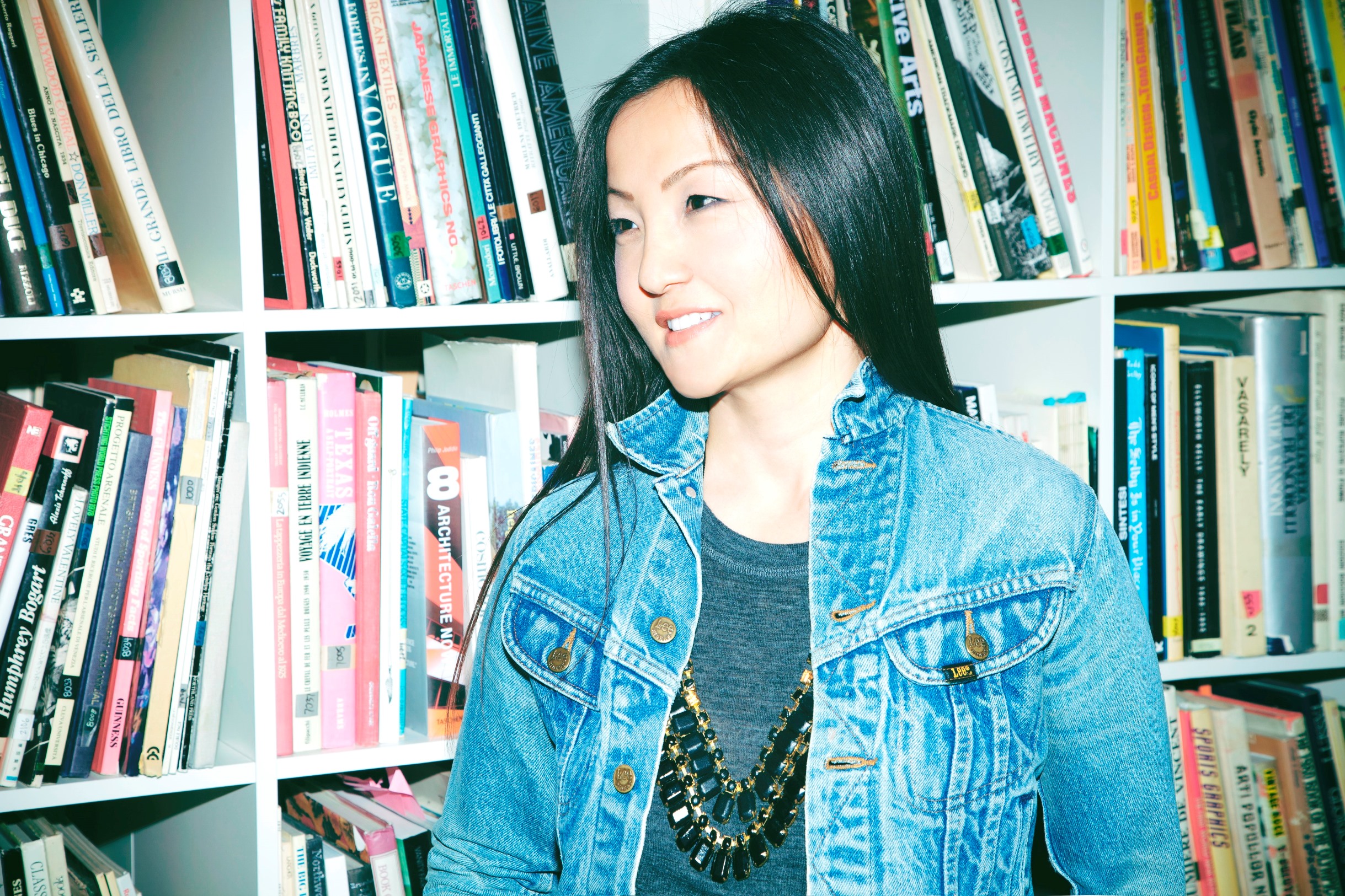Article: WOMEN OF INFLUENCE
ISSUE: FALL 2013
Influence comes in many forms, from high-profile advocates who are shaping ideas on an international stage to local heroes who are breaking barriers and defying expectations in their own communities. In our inaugural series celebrating influential Asian American women, Audrey Magazine highlights eight newsmakers, activists, leaders and trailblazers who encourage us to pursue our dreams, explore the unknown, and stand up for those without a voice.
CLICK HERE FOR MORE ASIAN AMERICAN INFLUENTIAL WOMEN!
by Ada Tseng
On September 11, 2001, Valarie Kaur watched in horror, along with her fellow Americans, as the two towers fell. A third generation Sikh American – her grandparents came from India to California a century ago as farmers – her fear and sorrow took on another dimension when she realized the image of America’s new enemy looked like her family. Kaur was flooded with email alerts about hate crimes directed at her community, and four days later, a man she knew as “uncle” was murdered in front of his gas station by a man who called himself a patriot.
Though her first instinct was to hide, Kaur and her cousin took a road trip across the country to chronicle hate crimes against Sikh, Muslim and other Americans. This initiated her journey an activist, and her footage was eventually edited into the 2006 feature-length documentary Divided We Fall: Americans in the Aftermath, with the help of filmmaker Sharat Raju, who would eventually become her husband and creative collaborator.
“When I look back at my college self, I see how much I had yet to learn,” says Kaur. “I was naïve about the challenges and personal costs of working for social justice. I hadn’t learned how to weave joy and balance into my projects, and I often worked myself into the ground. But I also admire parts of me: the easy impulse for compassion, a willingness to be vulnerable, a readiness to leap into the unknown.”
Kaur has been telling stories since she was teenager, realizing her Sikh faith, history and culture were absent from her schoolbooks. However, in 2004, when she was wrongfully arrested while filming a protest at the Republican National Convention and injured by a police officer – resulting in a chronic pain condition that left her functionally disabled in her right arm for years – she realized storytelling wasn’t enough. Embattled with the desire to fight for others, she enrolled in Yale Law School to work on civil rights issues.
After law school, she founded Groundswell at Auburn Seminary, a nonprofit initiative based on the idea that there’s “a groundswell of people, especially young people, who are calling upon their faith, tradition or moral compass to challenge the status quo.” Groundswell encourages people to lead campaigns for social change, whether they’re fighting for immigration reform, religious freedom, LGBTQ equality, human trafficking, hate crimes, gun violence – you name it.
Even with numerous success stories under her belt, Kaur’s life of activism is not without obstacles that challenge her faith. One such moment came on August 5, 2012, when there was a fatal mass shooting at a Sikh temple in Oak Creek, Wisc.
“The last year has been an unprecedented moment in the history of the Sikh American community,” she told India Abroad, who featured Kaur as a Person of the Year this June. “In the wake of Oak Creek, I experienced sadness and grief that felt similar to the aftermath of 9/11. But this time, 11 years later, something remarkable happened: the nation’s cameras turned to our community. For the first time in 100 years of history, we stood at the center of the nation’s attention. … As a result, tens of thousands of people stood with us to say that an attack on one of us is an attack on all of us.”
Civil rights organizations including the Sikh Coalition and Groundswell had been campaigning for years for the U.S. government to better monitor hate crimes, and this past June, an FBI advisory policy board passed the vote to track hate crimes against Sikh, Hindu and Arab Americans.
“Storytelling is an act of rebellion, art, introspection and revelation,” says Kaur, who is working on a feature documentary about Oak Creek. “I always knew that I wanted to spend my life using stories to help heal the world. But I didn’t know how. As a scholar, unearthing untold stories of the past? As a filmmaker, telling stories on the big screen? As a lawyer, using stories strategically in halls of power to fight on behalf of people? As a public intellectual, using stories to deepen national discourse in the media? For the last decade, I’ve experimented with all these forms of storytelling, and I began to blaze my own path.”
WEB EXCLUSIVES:
On Groundswell
Coming out of law school, I founded Groundswell, an initiative at Auburn Seminary that connects and equips people across many faiths and backgrounds in one network to wage campaigns. We train people to use storytelling in movements for social change using digital tools. We run campaigns responding to today’s most pressing social issues, including LGBTQ equality, human trafficking, hate crimes, and gun violence. In little over a year, our base has grown to nearly 100,000 members. We now invite all people of faith and moral conscious to use the Groundswell platform to launch their own campaigns.
On the Yale Visual Law Project, where she makes films and trains students in the art of visual advocacy at Yale Law School
The Yale Visual Law Project is now beginning its fourth year at Yale Law School. We have sister organizations at other law schools too. My hope is that more lawyers and advocates will partner with filmmakers to use storytelling for social change campaigns.
We recently released our latest film The Worst of the Worst about the practice of solitary confinement in America’s supermax prisons. The film shows how supermax prisons harm all who walk through the doors by using personal stories of the people inside: a former inmate trying to rebuild his life but haunted by memories from the prison, a guard suffering from PTSD and the buddies trying to help him, and a desperate mother on a mission to support a son who spends 23 hours a day in isolation. It reflects my belief that changing the world requires more than battling individual bad actors; it requires challenging those institutions of power designed to bring out the worst in us. Within months of its release, the film has played a role in reforming the supermax prison in Connecticut and emptying its cells.
Who influences you?
My mother’s father was Captain Gurdial Singh Gill, who lived with my brother and me our entire childhood. He is the single greatest influence on my life – my guiding star and pillar of wisdom.
My grandfather’s last lesson to me was this: In life, you will endure the noise and whip of the whirlwind. But if you dare to walk the path of a saint-soldier, the deepest part of your heart will always be sheltered from the swirling hot winds. You just have to practice residing in that still sacred center. For me, each day presents an opportunity to live boldly like Papa Ji, and each night to close my eyes with love and gratitude in my heart, as he did.

BUY THE FALL 2013 ISSUE FEATURING OUR WOMEN OF INFLUENCE HERE.











